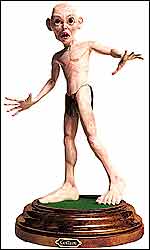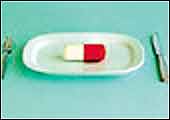|
|
|
Jethro Tull's Ian Anderson: Good music
just doesn't die
|
For
decades now, Ian Anderson has been paying the price for rather whimsically
naming two of his albums Living In Past (1972) and Too Old To Rock
'n' Roll: Too Young to Die (1976)! At the ritualistic media briefings
on the eve of a concert, two questions are tossed at the legendary
frontman of rock act Jethro Tull with unfailing predictability:
One, by dishing out songs composed as far back as 36 years ago,
are Anderson and Tull living in the past? Two, now that he's nudging
58, does Anderson feel he's reached that age when he's finally too
old to rock 'n' roll?
Perhaps tired of finding ingenious replies
every time thus queried, Anderson thought it time to make a subtle
"prepositional distinction" and shatter the widely-held
belief that Tull was hanging on for dear life to a nostalgic trip
because there wasn't much else to do. So in 2001 the group released
a dvd titled "Living With the Past," packed with two hours
of concert footage of songs largely from the, well, past. But the
difference is significant, explains Anderson. "The "with"
instead of "in" is very constructive, and indicates a
sense of history rather than mere nostalgia, which is just a safe
cocoon providing a blanket of security."
Last fortnight, to confuse even further, Tull
kicked off its two acts in Mumbai with the title track of Living
In The Past, and he'll probably do the same at the 100-odd other
concerts back home in the UK, in Latin America, Germany, and Eastern
Europe from February right through to May. Evidence that he isn't
too old to rock 'n' roll is in abundance: Anderson still does the
Krishna pose-standing on one leg and playing the flute-and struts
about the stage in tights, wild, wide-eyed (though, no longer wild-haired)
as he takes off on one of those raspy, surging solos.
To be sure, though, Anderson has been doing
pretty well in the present, too-putting together orchestral shows,
flirting with western classical music, and in Mumbai, with Hindustani
classical flautist Hariprasad Chaurasia. There's just enough time
for solo albums too for Anderson and Tull guitarist Martin Barre.
Anderson recognises that the recorded music
industry is "under pressure", and that probably explains
his long-winded tours. And he duly goes on to do his bit for the
anti-piracy brigade. "Music downloads aren't helping young
musicians. You have to keep in mind that for every 100 acts, just
one will succeed. So by downloading music, you aren't hurting Mariah
Carey, but the 99 other bands that can't be heard."
It wasn't like this in the seventies, although
Anderson maintains he didn't flirt with the "hippie ideologies"
of those times. And he doesn't think it's a particular good idea
to associate music with any typical era. "My music is a part
of life, and life isn't rooted to any particular decade. When you
listen to Beethoven, you don't say: 'Oh, that's 18th century music,'
now do you?" However, the founder of Jethro Tull does admit
that era had its "innocence and naivete. Also, it was the beginning
of progressive music, and musicians were keen to explore new influences",
says Anderson, whose music is difficult to classify, what with it
being a rich brew of folk, classical, and good old rock n' roll
strung together in immaculately-crafted melodies. "It's difficult
to do groundbreaking stuff today simply because it's already been
done. It's difficult to reinvent, for instance, Jimi Hendrix. And
there's Beethoven: big bold, all-embracing. If he was alive, he
would be the king of Bollywood. A.R. Rahman wouldn't stand a chance."
That's quintessential Anderson for you: The
articulate, provocative, naughty, seductive minstrel-not so much
in the gallery, but still playing with full gusto to it.
-Brian Carvalho
HEALTH
NOTES
GOLLUM'S ABS
 The
most vexing part of getting back into shape concerns the middle
of your body: the mid-section or abdominal area. Everyone who follows
a fitness regime dreams of perfect abs. Flat, taut and with the
right ridges. And almost everyone who tries to get there does a
whole bunch of exercises known as crunches. Crunches can be of different
types. Some are done on a flat surface like an exercise mat; others
are done on incline benches; yet others are done on special ab machines
with weights for additional resistance. Pursuers of flat, washboard
abs or a six-pack in the middle of their bodies typically do a combination
of different kinds of crunches-a few sets for the 'upper' abs, a
few for the 'lower' and 'middle' and, for good measure, some for
the 'sides'. The
most vexing part of getting back into shape concerns the middle
of your body: the mid-section or abdominal area. Everyone who follows
a fitness regime dreams of perfect abs. Flat, taut and with the
right ridges. And almost everyone who tries to get there does a
whole bunch of exercises known as crunches. Crunches can be of different
types. Some are done on a flat surface like an exercise mat; others
are done on incline benches; yet others are done on special ab machines
with weights for additional resistance. Pursuers of flat, washboard
abs or a six-pack in the middle of their bodies typically do a combination
of different kinds of crunches-a few sets for the 'upper' abs, a
few for the 'lower' and 'middle' and, for good measure, some for
the 'sides'.
Those words are in quotation marks for a reason.
They do not exist. There is no 'lower', 'middle', 'upper' or 'side'
abs. The abdominal muscle is one muscle-the rectus abdominis-which
starts at the ribs at one end and ends at the pubis. One largish
muscle with no separate parts. So doing specific crunches to target
a particular 'part' of your abs is meaningless.
Yet crunches, like any other resistance-based
exercise, are useful. Like your biceps or pectorals or triceps or
any of the other muscles, the rectus abdominis also responds to
resistance training and develops both strength and form. And yes,
crunches do work this muscle. But if you expect crunches to rid
you of your beer belly or that podgy layer of fat that covers your
mid-section that makes you look silly in a pair of jeans, you're
sadly mistaken.
Crunches can't spot reduce fat. Period. The
only way you can get that layer off is by burning calories overall.
Actually, that isn't the only way. There is another (and that's
why the title of this piece is what it is). You can eat less and
lose fat. Restricting the intake of calories forces the body to
burn fat. But that route (like the sidebar on this page cautions
you) can cause trouble. You might end up looking like Gollum-the
character in the Lord Of The Rings, a hobbit whose form was drastically
changed by the power of the One Ring into a lean frame of skin and
bones. Although Gollum was very strong in lotr, let me assure you
that adopting the starvation route to fat loss will not make you
strong. And who wants to look like Gollum anyway?
So if crunches alone don't help and starving
yourself is a bad idea, is the six-pack going to remain elusive?
Not really, but if you're serious about getting it be prepared for
endless drudgery. The only way to get perfect abs is by shedding
fat through exercise (think 20 minutes of jogging, running or cycling
regularly) plus crunches to strengthen and grow your abs. There's
a third thing you have to do: eat sensibly; don't starve but watch
your calories. Oh, I was forgetting the drudgery part. If you want
fab abs, you'll have to follow this regime for the rest of your
life. Enjoy!
-Muscles Mani
FAQS ABOUT
SLIMMING PILLS
 What are they?
What are they?
Most slimming pills are formulations that use a cocktail of amphetamines
that curb appetite or increase the basal metabolic rate. Consequently,
you eat less, the body burns more fat-sometimes even muscle-and
lose weight.
Any side-effects?
Plenty. These drugs tamper with normal hormonal activity and can
cause a number of problems. The most common: increased palpitation,
nervousness and unstable thinking. In the long run, these formulations
can even interfere with the normal functioning of the kidneys and
liver.
Do docs approve?
Never. Says Rekha Sharma, Chief Dietician, AIIMS: "No right-thinking
doctor would ever recommend these pills. Simply because these pills
serve no effective purpose and end up damaging the system. Besides,
the effects are short-term-once you're off the pills, your regain
weight."
Are there any alternatives?
None that is medically proven.
What about herbal weight-loss pills?
It's a myth that they can help. Says AIIMS' Sharma: "No formulation
is minus harmful ingredients; companies that claim to sell 'harmless'
Ayurvedic pills are either ignorant or irresponsible or unethical.
Unfortunately, our FDA isn't so effective, but in any case, no slimming
drug is FDA approved or legal."
How do you lose weight then?
Simple. Exercise regularly and control your diet. Eat less fat
and carbohydrates and don't miss your workouts, even if it is simply
a brisk 30-minute walk.
-Ananya Roy
|
